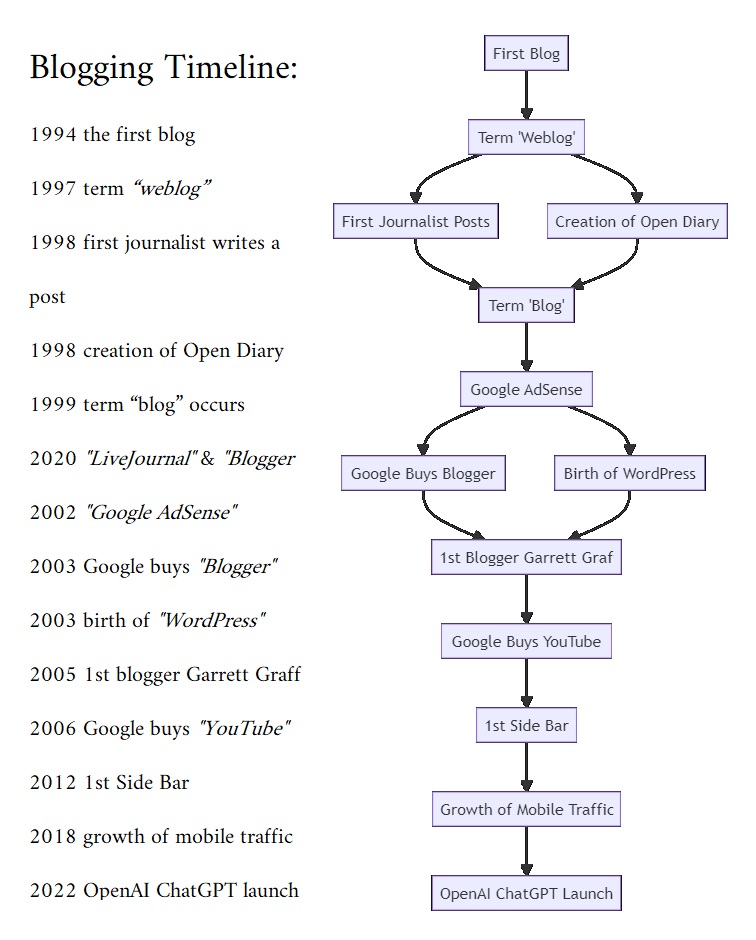What is Blogging?
Blogging, also known as web logging, refers to the practice of regularly updating a website or web page with written content, photos, videos, and other media.
It is a dynamic and interactive form of online communication that allows individuals or businesses to share their ideas, experiences, and expertise with a wide audience. Whether it’s a personal blog documenting one’s daily life or a business blog providing informative content, blogging offers a platform for expression and engagement.
If you want to learn all about the basics, you can find it in the basics of blogging article. In the meantime, this article explains what is blogging, its origins, evolution graphs, and more…
The Origins of Blogging.
The concept of blogging originated in the 1990s when individuals began sharing their daily experiences and opinions online. It was a way for people to express themselves and connect with others who shared similar interests or experiences. The early blogs were often called “weblogs” – a term coined by Jorn Barger in 1997. These early blogs were more like online diaries, where people would write about their personal lives, hobbies, and thoughts.
As the internet evolved, so did blogging. In the early 2000s, blogging platforms like Blogger and WordPress emerged, making it easier for anyone to start a blog without any technical knowledge. This accessibility led to an explosion in the number of blogs, covering a wide range of topics from fashion and food to politics and technology.
Over time, blogging has evolved from being a personal hobby to a powerful tool for businesses. Blogging allows companies to connect with their target audience on a more personal level and establish themselves as thought leaders in their industry. By providing valuable content, businesses can attract visitors to their website, generate leads, and ultimately increase sales.

The Evolution of Blogging.
- Blogging started as online diaries in the 1990s
- Blogging platforms like Blogger and WordPress made it easier for anyone to start a blog
- Businesses began utilizing blogs to connect with their target audience and establish authority
- Blogs can attract visitors, generate leads, and increase sales for businesses
In conclusion, the concept of blogging has a rich history that dates back to the 1990s. From its humble beginnings as online diaries, blogging has evolved into a powerful tool for personal expression and business growth. Whether you’re looking to share your thoughts and experiences or build a thriving online business, blogging offers endless possibilities.
Benefits of Blogging.
Blogging offers a multitude of benefits, serving as a platform for personal expression and fulfilling business needs. Whether you are an individual looking to share your thoughts and experiences or a business aiming to connect with your target audience, blogging can be a powerful tool.
For personal bloggers, it provides an avenue for creative expression and a means to connect with like-minded individuals. By sharing your stories, perspectives, and expertise, you can build an online presence and establish yourself as an authority in your niche. Blogging also allows you to engage with your readers through comments and discussions, fostering a sense of community and connection.
From a business standpoint, blogging can significantly impact your online visibility and brand authority. By consistently creating valuable and relevant content, you can improve your website’s ranking on search engines, making it easier for potential customers to find you. Additionally, sharing industry insights and expertise through blog posts can establish your credibility and build trust with your audience, ultimately driving more leads and conversions for your business.
Getting Started with Blogging.
If you’re interested in venturing into the world of blogging, here are some key steps to get you started.
- Choose a niche: Before starting a blog, it’s important to determine your niche or area of expertise. Select a topic that you are passionate about and have knowledge in. This will not only make it easier for you to create content but also attract a targeted audience.
- Set up a blogging platform: Next, choose a suitable blogging platform to host your blog. There are various options available, such as WordPress, Blogger, and Wix, each with its own features and benefits. Take your time to research and select the platform that aligns with your needs.
- Create compelling content: Content is the backbone of any successful blog. Focus on producing high-quality, engaging, and informative content that resonates with your target audience. Incorporate a mix of written articles, images, videos, and other media to keep your readers engaged.
- Promote your blog: Once you’ve created your blog, it’s crucial to promote it to attract visitors. Utilize social media platforms, email marketing, and SEO techniques to increase your blog’s visibility and reach a wider audience. Engage with other bloggers and participate in relevant online communities to establish connections and grow your readership.
Remember, blogging is a continuous process that requires dedication, consistency, and creativity. Stay committed to providing valuable content, engaging with your audience, and exploring different monetization methods to make the most out of your blogging journey. Happy blogging!
Popular Blogging Platforms.
There are several blogging platforms to choose from, each offering unique features and functionalities. Whether you’re a beginner blogger or have more advanced needs, these platforms provide an opportunity to create and customize your blog according to your preferences.
WordPress: WordPress is one of the most popular and widely used blogging platforms. It offers a user-friendly interface, a vast range of themes and plugins, and the flexibility to create both simple blogs and complex websites.
Blogger: Blogger, owned by Google, is another well-known platform that offers simplicity and ease of use. It provides a variety of templates, customization options, and seamless integration with other Google services.
Squarespace: Squarespace is a platform that focuses on design and visual aesthetics. It offers beautiful templates and a drag-and-drop website builder that enables users to create stunning blogs and websites without any coding knowledge.
Wix: Wix is a versatile platform that allows users to create visually appealing and interactive blogs. It offers a wide selection of templates, a user-friendly editor, and the ability to add advanced features such as e-commerce functionality.
These are just a few examples of popular blogging platforms available. Before deciding on a platform, consider your blogging goals, technical requirements, and the level of customization you require. Each platform has its own strengths and weaknesses, so it’s important to choose one that aligns with your vision and objectives.
Monetizing Your Blog.
Blogging can offer opportunities for monetization through sponsorships, advertisements, and selling products or services. Once you have established a strong online presence and have built a loyal audience, you can start exploring different ways to generate income from your blog.
Sponsorships are one of the most common ways bloggers make money. Brands and companies are often eager to collaborate with influential bloggers in their niche to reach their target audience. Through sponsorships, you can promote products or services in your blog posts, create sponsored content, or even participate in brand ambassador programs.
Advertisements are another effective way to monetize your blog. You can choose to display banner ads, text ads, or even native ads on your blog. The key is to partner with ad networks or platforms that align with your blog’s niche and target audience. This way, you can ensure the ads are relevant and valuable to your readers, increasing the likelihood of clicks and conversions.
In addition to sponsorships and advertisements, selling products or services can be a lucrative avenue for monetization. Depending on your expertise and niche, you can create and sell e-books, online courses, physical products, or even offer consulting services. Your blog serves as a platform to showcase your knowledge and establish yourself as an authority, making it easier to sell products or services to your audience.
Summary of what blogging is.
- Blogging allows for personal expression and connection with like-minded individuals.
- It improves website visibility and establishes brand authority.
- Engaging with readers and fostering a sense of community is possible through blog comments and discussions.
- Consistently creating valuable content can drive more leads and conversions for businesses.
Blogging is a versatile and powerful tool that can unlock numerous opportunities for both individuals and businesses. Whether you are looking to share your thoughts, showcase your expertise, or grow your brand, blogging offers a wealth of benefits that can make a significant impact. So why wait? Start your blogging journey today and reap the rewards!


Przemo Bania is a blogger and writer whose love of blogging began as an impulse, not as a hobby but a necessity, seeing his wife struggle with endometriosis. Przemo runs two other blogs which you can find by reading his story…

